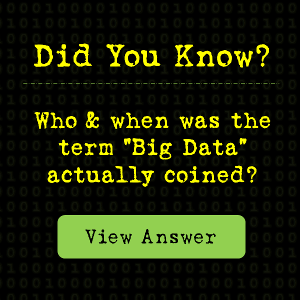Inside a Data Driven Organization
Published on 17 July 15
0
2

Isn’t just about every company in the world data driven already? In the business world, information technology (IT) is all about using technology to support and enable business functions, and most modern businesses already use IT in some way or the other. IT is used to provide the very core business platforms for e-commerce business, telecoms and SAAS-based businesses, but even those that are real world businesses use IT almost pervasively across the organization. Whatever the industry vertical, chances are that a modern business, whether local or global, already use IT a lot. They rely on IT to provide decision support to almost every function. And IT, of course, is all about processing data and making it available as information to support decisions. In addition, IT-enabled metrics and forecasts are even used to drive all sorts of functions, such as customer care or support call centers, strategic business planning, transportation fleet planning, and entire manufacturing and supply chain and inventories, and so on. The airline industry, as an example, relies on IT and data across just about every function on the ground and in the air as an operational and safety necessity. So aren’t all these businesses already data-driven? Why, then, has this term data driven arisen recently, and does it actually refer to anything new?
Being data driven is actually about the pervasiveness of a culture of using data in a closed loop manner in every function across the organization, top down and across it’s breadth. It goes beyond using data merely as a decision support but as a predictor of business paths for the future, along with feeding historic data and relevant external environment data back into the organization in order to continuously learn and discover, and to make improvements.
Business technology professionals are very familiar with using the three-pronged perspective comprising people, process and technology (or applications or infrastructure) to scope and describe systems, and this perspective can also be applied to define a data driven organization as well. Being data driven requires a combination of having people always working with the right data, within suitable process and methods frameworks and having the right tools and technologies to assist them.
People in data driven organizations
- have democratic, policy-based access to a single version of all data that may be relevant to their function
- are mandated by a top-down-driven culture of relying on objective data combined with expertise and experience to support their actions and decisions rather than subjective opinion
- are motivated to work towards measurable targets/objectives, and are rewarded and trained based on performance management systems that evaluate their achievement against those targets/objectives.
Processes
- prescribe standard ways of performing every core functional task, with boundaries and guidance provided in the form of limits, lookup references, validation checks, and so on
- extend into governance systems and business strategizing, with a clear organization for data ownership and stewardship, and a culture of using data in closed loop perspectives not just in core business functions but in every corporate support function as well
- for decision making recommend the use of prescriptive and predictive analytics to base decisions on fact and on validated hypotheses, both at the operational level as well as the strategic level.
Software Systems
- are built to facilitate and support a data driven culture, and they are made available as a set of applications and tools that empower their users
- readily enable data to be selected from anywhere within the organization or even from outside at the right time
- include analytics embedded at critical points in operational processes so that the most up to date data is always available when and where it is needed the most.
This blog is listed under
Data & Information Management
and IT Strategy & Management
Community
Post a Comment
You may also be interested in
Share your perspective

Share your achievement or new finding or bring a new tech idea to life. Your IT community is waiting!

 Mario Lewis
Mario Lewis








